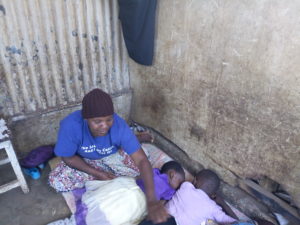Why I offer children of working parents a safe haven

Winny Manga, founder, Holy Trinity Day care in Makina, Kibera
Why I offer children of working parents a safe haven
By Betty Wughanga, Betty Wawuda & Mariam Ahmed
Winny Manga is always surrounded by children– some are wailing, others are doing something mischievous, while others are simply minding their own business or sleeping.
What is surprising is that even in her old age, Manga is able to keep up with all of them with dexterity and gentle love.

During our interview at the Holy Trinity Day care in Makina, Kibera we found her busy preparing lunch for the children while still keeping an eye on them. She is a second mother to many because many parents who cannot afford to hire a house help leave her at her baby care centre when they go to work.
Manga easily interacts with children, some as young as seven months old. They all know her as their teacher.
During lunch hours Manga prepares meal for the children, as she only requires parents to carry porridge for them.
“I prefer making lunch for them because not all parents can afford the same kind of meal. This ensures that the children get the same quality of food that is health and nutritious,” she says.
She started the centre after losing her job as a tailor in 2006 and also being diagnosed with kidney failure. She could not start or bend and she decided to use her love for children to help parents who have no one to leave their children with when they go to work.

In the last decade, many day care centres in slums have come up all over the country and provide an essential service to parents who work long hours and have no one to take care of their children at home.
According to a 2015 research by African population and Health Research Centre (APHRC) in Kenya and the McGill University in Canada called Daycare in a Nairobi Informal Settlement: a snapshot of Korogocho shows that many centres in slums have children aged between three and four years. The average ratio of caregivers to children is 1:22. Most of the centres do more than just taking care of the children, they monitor their health by checking their immunisation records before admission.
A majority 82 per cent said they would call the child’s parent or guardian when a child falls sick while 49 per cent said they would take a child to hospital in case of an injury or illness.
These day care centres however face various challenges. Manga says some parents make late payments and some even fail to come pick the children in time and this forces her to go home with them at times.
For the 13 years, Manga has been taking care of children she charges 100 shillings per day and 1,500 per month. She settled on that price because it is what most parents can afford. Those who are able, to pay as much as Sh3,000 and this has enabled her to cater for her hospital bills as well as take care of her family.

